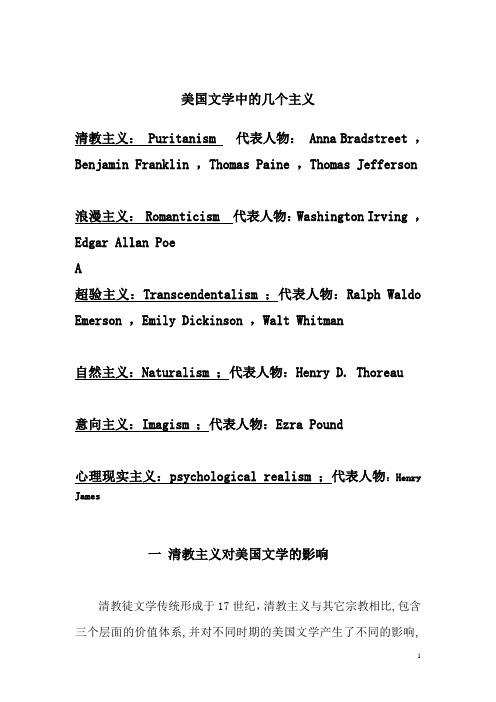美国清教主义简介American
清教主义名词解释

清教主义名词解释
清教主义,起源于英国,在北美殖民地得以实践与发展。
其因信称义、天职思想、山颠之城等核心理念,虽然构成宗教行为规范要素,却在很大程度上起到了消解禁锢人们思想与行为的主流教会传统的作用,促进了社会世俗化进程,在早期的美国,推动了个性解放,促成建立现代劳动、职业和财富观,以宗教的理想勾勒出国家未来追求的目标。
它们奠定了今日美国主流文化(wasp)价值观念的基础,铸就了美国民族特性。
清教思想:美国清教主义从一开始就是一种精神运动,它不仅仅是一种宗教信仰,而且还是一种极端民主与共和的理论。
清教徒在自己的祖国遭受迫害,对英国严酷的社会现实不满而移民到美国。
他们希冀按自己的意欲信仰上帝。
于是,他们致力于建立一个乌托邦式的重视伦理和精神生活的社会模式。
他们崇尚真正的自由——这种真正的自由涵盖了广泛的道德的含义。
他们把一切破坏和蔑视这种自由信念的行为一概斥责为对权威的亵渎。
因此,他们认为自己是一群称之为美国人的新人,命定要建立一个新的世界,为人类建造一座“山上的光辉的城市”。
清教主义对美国社会的影响

清教主义对美国社会的影响
清教主义是一种起源于16世纪英国的基督教宗派,其信仰强调个人责任感、劳动奉献、纯洁生活等价值观。
清教主义的传入对美国社会影响深远,从政治、经济、文化等方面塑
造了现代美国社会。
1. 对政治的影响
清教徒在美国建国的早期时期是政治领袖,他们的信仰使得他们具有强烈的道德观念
和责任感,这些品质让他们成为美国独立战争中最早支持独立的团体之一。
他们认为神是
所有事情的中心,美国应该受到神的指引。
这种思想在美国宪法的制定中占有很大比例,
分权制度、司法独立性等制度体系都反映了固有的道德原则。
清教徒普遍信仰“马克思原理”,强调个人劳动并确立了“劳动应得报酬”的观念。
这种价值观对美国经济产生了深远的影响,鼓励美国人们把劳动看成神圣的一般活动,并
且有了高度道德性质。
此外,他们也坚持较简洁的财产观,强调生活依据节制,也就是说,享乐主义被视为一种罪恶的形式。
这个思想也在巩固企业家的价值,并通过教育、工
作和问题解决等方面,强调人的财富应该来自于他们的努力。
清教徒强调读经,着重于教义的学习和思考,这是一个强调个体自由、知识的独立和
解释、冒险和创造力的文化。
清教徒因此在美国文化中建立了教学和学术的领袖地位,这
也使得美国成为文化和教育方面最具影响力的国家之一。
清教徒还促进了宗教多元化和信
仰自由的传统,这在文化和社会的发展中具有深刻的影响。
总之,清教主义建立了美国社会的基本价值观,这些价值观贯穿于美国现代化过程当中,成为了美国人的信仰体系和生活方式的重要支柱。
美国清教主义:掠夺自然肇始者

美国清教主义:掠夺自然的肇始者摘要:清教主义首先促使来到新大陆的早期移民与其故土最终决裂,继而又激发了定居者为获取物质积累和建构自我身份的热情。
在巨大物质利益的驱逐下,这些移民对彼处大片沃土进行了无情地开发和掠夺,他们榨取了数不尽的自然资源,严重破坏了当地的自然生态循环。
从这个意义上说,美国清教主义该被视为生态危机的始作俑者而受到谴责。
g171.2 文献标识码:a 文章编号:1006-026x (2012)07-0000-02引言世纪初,随着国内宗教和政治矛盾的加剧,不列颠集中涌现出一批强烈反对国教圣公会强加给教徒的僵化教义与繁文缛节并最终不堪其宗教迫害而移居国外的人—清教徒。
他们认为,人生而有罪,对原罪的救赎只能通过后天的不懈劳作实现,不懈劳作是责无旁贷的宗教义务。
踏上北美大陆的早期欧洲移民便是秉承上述清教主义的一批狂热分子。
不懈的劳作使他们驯服了新大陆的大片荒地,并在彼处成功建立了自己的国家—美利坚。
此后的两百多年,清教思想又驱使他们向西推进,淘金挖矿,垦殖放养,所到之处,自然宝藏皆被洗劫一空。
几百年来,清教思想在美国人的头脑中已根深蒂固,它并激励着他们不断扩张与占领。
在宗教意义上,这样的扩张被冠名为取得普世救赎的神圣手段。
在实际生活中,清教思想也因其鼓吹的的兢兢业业的工作态度、一丝不苟的自我约束和持续的主动与活力而为人称颂,尤其被有不断崛起需求的美利坚所推崇。
事实上,频繁扩张逐渐表现为美国的帝国主义掠夺行径,直接导致了其他国家经济上的匮乏和对美国的依赖。
与此同时,清教主义驱使下的美国扩张模式给自然环境和生态系统带来了不可逆转的影响与破坏。
一定意义上,清教思想启动了人类对自然的过度索取与征服,把人类逐步引向生态灾难。
1.清教思想源起及其教义和教义。
1.1 清教主义发端于十六世纪早期。
其时,日益升级的欧洲宗教斗争最终引爆了新教改革,结果是分化了的教派,其中一支信奉加尔文主义,其教徒被称为清教徒。
美国文学中的几个主义

美国文学中的几个主义清教主义: Puritanism 代表人物: Anna Bradstreet ,Benjamin Franklin ,Thomas Paine ,Thomas Jefferson浪漫主义: Romanticism 代表人物:Washington Irving ,Edgar Allan PoeA超验主义:Transcendentalism ;代表人物:Ralph Waldo Emerson ,Emily Dickinson ,Walt Whitman自然主义:Naturalism ;代表人物:Henry D. Thoreau意向主义:Imagism ;代表人物:Ezra Pound心理现实主义:psychological realism ;代表人物:Henry James一清教主义对美国文学的影响清教徒文学传统形成于17世纪,清教主义与其它宗教相比,包含三个层面的价值体系,并对不同时期的美国文学产生了不同的影响,表现出不同时代特征,以清教主义作为参照系,可以说17世纪美国文学是“信仰时代的文学”,18世纪美国文学是“世俗时代的文学”,19世纪美国文学则可称为“宗教批判与宗教道德时代的文学”。
发端于英国的清教主义对美国社会有着更大的影响,“英格兰有过清教革命,却没有创建清教社会;美国没有经历清教革命,却创建了清教社会”①。
并且这种影响以其持久深厚而铸就了美利坚民族的灵魂。
正如朱世达先生所言:“清教传统像一条红线规范了从殖民时代到如今的美国的政治文化与社会文化”②。
作为美国文化一个独特的源头,清教主义在美国经历了由表及里、由明转暗的曲折发展,最终形成有美国特色的清教价值体系,从某种意义上说,文学是这一发展历程的最好见证。
一般而言,宗教都包含信仰与道德两个层面的价值体系。
清教主义的传播和渗入伴随着早期的移民拓荒、定居北美的整个过程。
作为一种教义 ,清教主义不再具有原有的意义 ,但它对新英格兰乃至整个美国由来已久的影响 ,却在美国形成了一种特殊的文化氛围 ,不仅与美国人性格中的个人主义有联系 ,对美国文学的发展和特点也起着重要作用。
浅谈美国清教

浅谈美国清教英本二班2012410010224魏宇婷清教,基督教新教派别之一。
16世纪出现于英国。
该派要求以加尔文学说为依据改革英国国教会,承认《圣经》为唯一权威,反对国王和主教的专制。
主张清除国教会所保留的天主教旧制度,简化仪式,提倡过勤俭清洁的生活,故名。
后又分为长老派与独立派。
清教徒并不是一种严格意义上派别,而是一种态度,一种倾向,一种价值观,它是对信徒群体的一种统称。
清教徒是最为虔敬、生活最为圣洁的新教徒,他们认为“人人皆祭司,人人有召唤”。
认为每个个体可以直接与上帝交流,反对神甫集团的专横、腐败和繁文缛节、形式主义。
他们主张简单、实在、上帝面前人人平等的信徒生活。
一、清教起源与发展清教产生于英国16世纪后半期,实际上是新教中的一支——加尔文派。
在亨利八世与罗马天主教会决裂后,英国国教成了以国王为首的维护国王统治的工具,教会内部仍然腐朽不堪。
16世纪后期,教会内部分虔洁信徒者提出要求,清除国教中天主教的残存因素,他们的主张被称为“清教”,他们则被称为清教徒。
他们要求信仰上只以新约圣经为准则,而非以教会或所谓传统制度作为信徒应当遵奉的权威。
他们特别强调教会必须是具备圣经所示条件的真宗教和圣洁无庇的真教会。
清教是一个广泛、不确定的名称,包括许多不同集团和派别。
但,他们有一个共同特征,即提出了和英国国教不同的新的教义、仪式和组织原则。
16世纪末,清教各集团中形成了两个主要派别,长老派(presbyterian)和独立派(Independents)。
前者代表资产阶级和新贵族上层的利益,主张建立一个隶属于国家的长老制教会组织。
;后者代表中等资产阶级和新贵族的利益,认为每个教区应独立自主,反对国家教会的原则。
16世纪末清教运动受到镇压转入低潮,但在斯图亚特王朝时期再次兴起。
清教徒不仅在宗教会议和教会活动中批判主教制政府,还在议会内外积极进行反对专制王权的宣传鼓动工作,为英国资产阶级革命作了充分的思想和舆论准备。
美国强大背后的清教主义价值观

美国强大背后的清教主义价值观在三个世纪的时间里,一小撮卑微的殖民者依靠清教徒的宗教精神,把美国建成为世界最强大的经济和政治实体,美国的管理文化也由此成为通行全世界的商业准则。
下面是分享的美国强大背后的清教主义价值观,一起来看看吧。
肯尼斯;霍博和威廉;霍博兄弟有意为此做史,探究管理文化的本质,兄弟俩曾得到德鲁克、戴明等管理大师的鼓励与期待,无论哪个国家或层级的领导者,都学会建设一个强大的经济组织都需要什么?以及失去这些东西是多么地容易!1、清教主义的价值观清教徒源于英国的加尔文教信徒,属基督教新教的一个派别,17世纪70~80年代,清教徒人数激增,并脱离英国教会,建立独立的宗教组织。
清教徒不仅仅是一种派别,更是一种态度,一种倾向,一种价值观。
清教徒是创业精神的代言人、崇尚商业和工业活动、对一切充满了信心,他们善于创造和创新,不断地开拓和征服,这些文化核心的活力、社会流动性、竞争力和创新力,其源头就是来自于清教徒的纪律及精神特质,这些特质构成了美国的管理文化。
传统美国社会,特别新英格兰,具有四个紧密相连的特点,其渊源可以追溯到马萨诸塞湾殖民地时代,直到今天仍影响着大部分美国公民的价值观,主要包括:(1)、人生目标不管多么模糊,归根到底都是建造“人间天国”的坚定信念。
(2)、拥有机械天赋、喜欢亲力亲为的技师精神。
(3)、把集体利益置于个人利益之上的道德观念。
(4)、能够根据大大小小的目的协调各种财力、物力和人力的组织能力。
所有这些特点都与传播到“新大陆”的清教主义密切相关。
2、清教主义价值观之一:人间天国笼统地说,美国的建国行为表现为一种对社会未来坚定不移的乐观精神;;这在当时世界各国中独一无二;;并坚信难题之所以出现是为了得到解决,最具代表性的代言人之一是本杰明;富兰克林,他从未怀疑美国永远是朝阳,富兰克林还精辟地用一句话定义了美国:“新大陆不看你是谁,只看你有什么本事。
”又一个世纪后,1923~1929年时任美国总统的柯立芝告诉我们,“美国不承认任何贵族,除了工作的人。
美国清教主义的形成和危害
美国清教主义的形成和危害摘要:部分英国清教徒远涉重洋来到美洲定居以来,清教思想就一直是美洲殖民地以及美国的主流思想。
对照《圣经》,我们就会发现清教主义严重偏离了耶稣的思想。
他们残杀印第安人、奴役黑人、发明核武器威胁人类、以及在国外发动战争等,这都来源于清教主义的理论支持。
因此,清教徒应认真反思历史错误和邪恶,要真正以耶稣基督为师、根据耶稣的本质思想去修学。
这样才能拯救自己、拯救世界 !关键词:耶稣;清教徒;以耶稣为师;拯救自己清教思想的形成有一个相当长的演变过程,它来源于许多国际宗教形势和世俗形势的强大影响。
基督教、天主教和新教本来都是一回事,信仰的都是《旧约》和《新约》,信仰天主和耶稣基督,但是主教们、信徒们对于经书的理解出现了严重的分歧,于是就产生了不可弥合的分裂,后来更是产生了许多的改良宗教。
清教原来是英国一个饱受迫害的小教派,最后由于美国的因素就演变成为世界上势力最大的一个新教派。
一清教主义的出现耶稣在公元元年出生于耶路撒冷城东南方向的伯利恒。
由于传播了不同于传统犹太教的思想,他就被自己的学生犹太人出卖给了仇恨耶稣的犹太长老。
长老们向罗马总督彼拉多告发了耶稣,并迫使彼拉多钉死了自己的思想对手。
其信徒被迫离开家乡,西去罗马秘密传教。
可是罗马人极端仇视,给予信徒的迫害颇为残忍严酷、惨不忍睹。
许多主教和信徒被烧死、被砖块砸死、或者被抓去放在竞技场中在几万人的目睹欣赏中被饥饿的雄狮吃掉。
但是地下教会依然继续发展壮大,最后迫使罗马帝国在公元 313年承认了基督教的合法地位,基督教于是迅速传播到了欧洲各地。
392年,基督教正式成为罗马帝国的国教;到了 395年,罗马帝国分裂为东西两个部分。
自476年西罗马帝国被强悍的日耳曼人灭亡之后,教会便成了西欧中世纪时期的唯一学术权威;因为当时几乎只有牧师和修士才能读书识字,所有的学者也都是教会人士。
所使用的语言就是古罗马帝国的官方语言--拉丁语。
于是,西欧便开始渐渐陷入一片黑暗的迷信和迫害异己的时代,史称“黑暗的中世纪”。
美国价值观之清教主义根源
美国价值观之清教主义根源美国价值观之清教主义根源美国作为一个以自由、民主与个人权利为核心的国家,其价值观的形成离不开清教主义的影响。
清教主义是早期英国改革运动的一部分,于17世纪初传入美洲,成为美国殖民地最重要的宗教信仰。
在长期的历史发展中,清教主义深深嵌入了美国社会、政治和文化的各个方面,对塑造美国人民的思想观念和行为方式产生了深远的影响。
清教主义最早的根源可以追溯到16世纪初英国的宗教改革运动。
当时的英格兰国教会受到罗马天主教会积弊的影响,清教徒们希望通过改革使教会回归到早期基督教的核心教义,去除一切不合圣经教导的教义和仪式。
他们主张注重个体与神的直接联系,反对灵魂的中介,强调内心的信仰体验,推崇信徒的责任和个人的道德行为。
这些观念在美洲的殖民地中不断发展,形成了清教主义。
清教徒们在寻求宗教自由和实践信仰自由的过程中,将目光投向了新大陆。
他们希望在新世界建立一个完全属于自己的社会,可以在其中按照自己的信仰和原则生活。
在1620年,第一批清教徒乘坐“五月花号”船到达美洲,建立了普利茅斯殖民地。
这次迁徙标志着清教徒在美洲的开始,也为美国的建国奠定了深远的影响。
清教徒们将他们的信仰视为上帝赐予的使命,相信他们通过在新大陆上建立道德、纯洁的社区,可以成为上帝的选民,建立一支光辉的城市。
他们的信仰体系强调个人责任和道德观念,对于他们来说,个体的道德行为是获得救赎的表现,也是构建一个神圣社会的重要因素。
清教徒们积极追寻个人敬虔和社区公共生活之间的平衡点,他们注重个人的宗教体验,教导信徒诚实、廉洁和奉献的价值观。
清教主义对美国人民的思想观念和行为方式产生了深远的影响。
清教徒们对个体的重视和自由信仰的追求催生了美国的宪政传统。
美国国父们在起草宪法过程中,深受清教主义的影响,他们坚信个体的信仰自由和人权应该受到保护,这就体现在《宪法修正案》中对言论自由、信仰自由和平等权利的重视。
此外,清教主义对美国社会的道德规范和价值取向也产生了深远的影响。
清教主义
《清教主义》(2006-04-28 17:33:17)转载分类:科学文化清教主义总说明Puritans 是名字被给在16 世纪更加极端的Protestants 在认为英国之内的教会英国改革没有进来足够在改革教会的教条和结构; 他们想净化他们的全国教会由消灭宽容影响每块细片。
在17 世纪许多Puritans 移居了对新世界, 在哪里他们寻找了对发现了圣洁联邦在新英格兰。
清教主义依然是统治文化力量在那个区域入19 世纪。
相信700 个宗教主题我们的名单电子邮件英国清教主义完全联系没有唯一教会的神学或定义(虽然许多是Calvinists), 英国Puritans 知道起初为他们的极端重要态度关于宗教妥协被做在伊丽莎白一世期间王朝。
大多数是剑桥大学的毕业生, 并且他们成为了Anglican 教士做变动在他们的地方教会。
他们鼓励了直接个人宗教经验, 恳切的道德品行, 和简单的崇拜服务。
崇拜是Puritans 设法最改变事的区域在; 他们的努力在那个方向由强烈的神学信念和确定期望关于怎样承受了基督教应该严重被采取作为人的存在焦点。
1603 年在詹姆斯我成为了英国的国王之后, Puritan 领导要求他赠与几项改革。
在Hampton 法院会议(1604), 然而, 他拒绝了大多他们的提案, 包括主教的废止。
清教主义, 由理查·巴克斯特, 获得的普遍的支持最好表达由威廉Ames 和以后及早在17 世纪。
政府和教会阶层, 然而, 特别是在大主教威廉赞美之下, 变得越来越压抑, 造成许多Puritans 移居。
那些保留了形成了一个强有力的元素在击败了查尔斯i 在英国内战中的议会党之内。
在战争以后Puritans 依然是统治在英国直到1660 年, 但他们比老阶层争吵了在他们自己之中(Presbyterian 优势让路了对独立, 或集合, 控制在Oliver Cromwell 之下) 并且证明了更加不宽容。
Part 1 American Puritanism 美国清教主义
Part 1American Puritanism to Enlightenment – Colonial PeriodI.American Puritanism (north colonies):i.Puritans: The settlement of the North American continent by the English began in theearly part of the 17th century (―Mayflower‖,1620) – on America’s northern seacoast– New England – the first settles who became the founding fathers of the Americannation were quite a few of them Puritans.ii.Ideal of Puritans: They were idealists to ―purify‖ the rituals of the church, to lessen the authority of bishops, believing that the church should be restored to the ―purity‖of the first century church as establish by Jesus Christ himself.⏹By the time of Elizabeth’s reign, the church of England was clearly Protestant inrespect to its separation from Rome.⏹Puritans were originally devout members of the Church of England⏹The reign of Queen Mary – immigrating to America searching for religious freedom–ironically: the term of ―Puritanism‖implies religious intolerance, bigotry,austerity of taste, killingjoy way of life. why? ( They persecuted the witch or thosewhom the community deemed ―hellish‖– Hawthorn’s The Scarlet Letter ) TypicalPuritan’s way of life – in harmony with their somber religion, stressing hard work,thrift, piety, and sobriety; the most popular image – a teetotaler, gaunt, lank-haired,wearing a black steeple hat – in fact a distortion, evoking for a time, antipathy anddisgustiii.Puritanism: Puritans were a group of serious, religious people, they had their own code of values, a philosophy of life, and their point of viewA: Three basic puritan tenets:⏹God’s absolute sovereignty -- God is all-powerful and asserts His influence in everyevent of human life⏹Original Sin –AS a result of Adam and Eve’s eating the forbidden fruit, allhumanity is completely wicked.⏹Predestination – Human races is predestined by God (John Calvin)(Tenets of John Calvin: The state should be the servant of the church. ―original depravity‖, ―In Adam’s fall, we sinned all‖– man cannot redeem his original sinfulness–―Redemption, therefore, must be a free gift from God. Only He and no one else maydecide who is to be saved and who is to go to hell –―Predestination‖– Christ, therefore,did not die for all, but only for those who are to be saved )B. An ethic was developed around hard work: The drive for money and the acquisitionof wealth through work may not be a step toward salvation ( since there was no choice)but perhaps a sign that one was saved. If life were a discovery of whether or notsomeone was saved, then every event was significant. Of one acted in a way that wasnot in accordance with this belief, then one was surely not saved and definitely a threatto the existing order.C. Many writers regarded the settlers as God’s agents, sent under His ―wonder workingprovidence‖ to make homes for His chosen and to convert or destroy the Indians whomthey felt were sent by the devil to disturb their progress. The writing brought home tothe average church member a fear and wonder for God’s workings – nothing was writtenfor mere amusement – plain style, Biblical allusion (quotation, sermons)iv.American Myth:⏹American literature is based on a myth – the Biblical myth of the Garden of Eden⏹ A literary expression of the pious idealism of the American Puritan bequest –optimistic⏹Religious and utilitarian -- reflecting those people’s striving for salvation, especiallymateriallyv.American Dream (basically optimistic)⏹religiously pious and practical⏹west land to explore, unlimited opportunities, forbidding natural surroundings thatintriguing people’s fighting spirit –― A sup of New England’s air is better than awhole draft of old England’s ale‖ Francis Higginson New Englan’s Plantation 1630 )–The very severity of the frontier conditions taught the American Puritans to betougher, to be every ready for any misfortunes and tragic failures that might lie inwait for them.⏹individual success – individualismII.Literary Scene ( Puritan and Enlightened ):i.theme: about their voyage to the new land, about adapting themselves to unfamiliarclimates and crops, about dealing with Indians, about the land which stretched beforethem – unimaginable and immense, with rich dense forests and deep blue lakes andrich soil – all seemed possible through hard work and faithii.form: English literary tradition imitatednguage style: fresh, simple and direct, plain and homely, honest rhetoric, Biblical allusioniv.representatives:( William Bradford, Anne Bradstreet, Edward Taylor, Thomas Paine )A. Philip Freneau – religious freedom – dawning nationalism, American subject matter,poet of American revolution-- The Wild Honey Suckle-- The Indian Burying GroundB. Jonathan Edwards –religious ecstasy –influence upon later years: Emerson,anticipating 18th c. TranscendentalismC. Benjamin Franklin (1706-1790)⏹opposite of Edwards: the paradox of Puritan materialism and immateriality⏹Jack-of-all-trades, a self-made man⏹The symbol of the Age of Enlightenment, age of Reason – leading to the Age ofRomanticism⏹Poor Richard’s Allmanac⏹Autobiography – how a man should live his life, 13virtues,(industrious, frugal, prudent etc.)-- a Puritan document: self-examination andself-improvement, self-reliance, the fulfillment of the―American Dream‖–sense of optimism revolution --romantic-- spokesman for the new order of 18th c. AmericanEnlightenment: Man is basically good and free, by natureendowed by God with certain inalienable rights of libertyand the pursuit of happiness – benevolence of God--style: simplicity, directness, concision, plainness,homeliness of imageryD. An opposite tone: pessimisticSt. John de Crevecoeur⏹He saw and spoke of the illusory nature of that American dream, being aware ofthe existence of slavery, avarice, violence, famine and disease – all forms of evilthat he thought the American had not left behind with his migration to this sideof the Atlantic⏹Thus almost at the very beginning, the New World had in its constitution theelements of the old, and the ideal had as its twin brother – the anti-ideal⏹Leading to the note of pessimism first clearly heard and heeded in Mark Twain’sThe Gilded AgeIII.Southern Plantation: a landed aristocracy, its own intelligentsiaIV.Middle Colonies: American toleration--Dutch, Swedish – New York, Pennsylvania – all nationalities’ folk stories providing forthe materials for later Romantic writers, such as Washington Irvingparison between American Puritanism and Chinese Confucianism ( after-class discussion)⏹Confucius⏹Confucianism-- the moral and religious system of China founded Confucius by the end of the6th c. B.C. His original sayings ( Analects ) were edited with commentaries byMencius in the 4th B.C., and his philosophy was further developed by Chu Hisin the 12th c. and by Wang Yang-ming in the 16th c.-- Basically it is a system of ethical precepts—benevolentlove, righteousness, decorum, wise leadership, sincerity – designed to inspireand presence the good management of family and society.-- A theological dimension was introduced in the 2nd c. B.C. when Tung Chung-Shurelated the five virtues to a cosmic order governed by Shang-Ti ( ruler of heaven) towhom the emperor was immediately responsible. It became the official doctrineof Imperial China under the Han Dynasty ( 2nd c. B.C. –2nd c. A.D.). Ritualsacrifice in appointed shrines characterized Confucianism from the 1st c.B.C. untilthe People’s Republic of 1949.-- Eclipsed by Taoism and Buddhism from the 3rd c. to the 7th c., Confucianism wasrevived and made the state religion under the Tang Dynasty (618-906)-- Neo-Confucianism, strong between the 10th c. and the 13th c.. opposed thesupernatural quietistic tendencies of Buddhism and Taoism, advocating a humanisticsearch for truth.-- From the 2nd c. B.C. until the 20th c., Confucianism was the distinctive philosophyof China, and the basis of social organization, education and administration.。
- 1、下载文档前请自行甄别文档内容的完整性,平台不提供额外的编辑、内容补充、找答案等附加服务。
- 2、"仅部分预览"的文档,不可在线预览部分如存在完整性等问题,可反馈申请退款(可完整预览的文档不适用该条件!)。
- 3、如文档侵犯您的权益,请联系客服反馈,我们会尽快为您处理(人工客服工作时间:9:00-18:30)。
美国清教主义简介American Puritanism名词Puritanism1. The beliefs and practices characteristic of Puritans (most of whom were Calvinists who wished to purify the Church of England of its Catholic aspects)2. Strictness and austerity in conduct and religion重要地位:American Puritanism was one of the most enduring shaping influences in American thought and American literature. It has become, to some extent, so much a state of mind, rather than a set of tenets, so much a part of the national cultural atmosphere that the Americans breathe. Without some understanding of Puritanism, there can be no real understanding of American culture and literature.历史渊源Puritans was the name given in the 16th century to the more extreme Protestants(新教徒,基督教徒)within the Church of England who thought the English Reformation (英国宗教改革)had not gone far enough in reforming the doctrines and structure of the church. They wanted to purify their national church by eliminating every shred of Catholic influence. In the 17th century many Puritans emigrated to the New World, where they sought to found a holy Commonwealth in New England. Puritanism remained the dominant cultural force in that area into the 19th century.Puritans believed that human beings were predestined by God before they were born. Some were God's chosen people (God's elect 上帝的选民)while others were predestined to be damned to hell. The success of one's work or the prosperity in his calling given by God was the sign of being God's elect. Therefore, everyone must work hard, spend little and invest for more business. Working hard and living a moral life were their ethics. They regarded Bible to be the authority of their doctrine. To be able to read the Bible and understand God's will, education was essential for Puritans.Puritanism in New England (Massachusetts, Connecticut, New Hampshire, Vermont, Maine and Rhode Island) made a great influence on American culture. The Puritans hoped to build "a city upon hill"—an ideal community. New England also established another American tradition—a strain of often intolerant moralism. The Puritans believed that government should enforce God's morality. They strictly punished drunks, adulterers, violators of the Sabbath(安息日)and other religious believers different from themselves. The American values such as individualism, hard work, and respect of education owe very much to the Puritan beliefs.发展与困难Pushing the frontiers with them as they moved further and further westward, they became more and more preoccupied with business and profits. They became more practical. The very severity of the frontier conditions taught the Americans Puritans to be tougher, to be ever ready for any misfortune and tragic failures that might lie in wait for them.All through the nineteenth century and especially in the first few decades of the twentieth, Americans Puritans came under violent and often virulent attacks for their religious intolerance and bigotry, for their austerity of taste and killjoy way of life, for the very heritage they bequeathed to the new nation. But the fact still remains that Puritanism alone has been the most powerful shaping factor in the cultural maturity of theAmerican nation. It has burned its way into the very fabric of American social life, and way down into the American consciousness, so that even the most incorruptible anti-Puritans cannot escape its influence.深入骨髓:对文学的影响乐观主义American literature—or Anglo-American literature—is based on the Biblical myth of the Garden of Eden. The Puritans dreamed of living under a perfect order and worked with indomitable courage and confident hope toward building a new Garden of Eden in America. With such a sense of mission, the Puritans looked even the worst of life in the face with a tremendous amount of optimism.Emerson saw the American as Adam himself reborn, standing simple and sincere before the world. Thoreau portrayed himself as an Adam in his Eden. Whitman felt rapturous at the sight of the Americans bustling with activity as the children of Adam restored to their lost paradise. Henry James talked about the innocence and simplicity of his Americans as so many Newmans. The spirit of optimism burst out of the pages of so many American authors. Optimistic Puritan has exerted a great influence on American literature. American authors have been the outset conditioned by the puritan heritage to which American authors have been the most communicative heirs.象征主义The American Puritan’s metaphorical mode of perception was chiefly instrumental in calling into being a literary symbolism which is distinctly American. Puritan doctrine and literary practice contributed to no small extent to the development of an indigenous symbolism. To the pious Puritan the physical phenomenal world was nothing but a symbol of God. Physical life was simultaneously spiritual; every passage of life, en-meshed in the vast context of God’s plan, possessed a delegated meaning. The world was one of multiple significance.Charles Feidelson: “instinct with meaning by reason of God’s concurrence and susceptible of interpretation by reason of God’s salient act.” Jonathan Edwards saw nature and even the Bible as “radically figurative”. Emerson’s Nature is like a “continuous monologue”. With Hawthorne, Melville, Howells and many others, symbolism as a technique has become a common practice, it is indeed as it should be. This peculiar mode of perception was an essential part of their upbringing.朴素文风With regard to technique one naturally thinks of the simplicity, which characterizes the Puritan style of writing. The Puritans have been abhorred for their austerity and rigidity in matters of taste, “notorious” for their distaste for the arts and for any manifestation of sensuous beauty. Although there is an amount of truth in all this, it is perhaps too much a distortion.As Perry Miller tells us, the Puritans drank and dressed themselves in all the hues of the rainbow. They build schools, encouraged learning, and loved reading, making New England and the east seaboard centers of culture comparable in more ways than one to England and Europe. With regard to their writing, the style is fresh, simple and direct; the rhetoric is plain and honest, not without a touch of nobility often traceable to the direct influence of the Bible. All this has left an indelible imprint on American writing. American Puritanism has been, by and large, a healthy legacy to the Americans.What is Calvinism:It is a series of theological beliefs first promoted by John Calvin (1509-1564), one of the leaders of the Protestant reformation. They were affirmed by the Synod of Dordt (1618-1619 CE) as being the doctrine of salvation which is contained in the Bible. It laid the foundation for Reformed Theology.Calvinism is often summarized by The Five Points of Calvinism, which are easy to recall by using the acrostic "TULIP:"T:This usually stands for "Total depravity:" This is often mistaken to mean that humans are all hopelessly, intensely sinful. Actually, it means something quite different: as a result of Adam and Eve's disobedience to God -- the Fall of Man -- sin has extended to all parts of every person's being: "his thinking, his emotions and his will." 1Sometimes, this has been called "Total inability." This is the concept that it is impossible for the ordinary "natural" human to understand the Gospel's message. They are spiritually helpless. First, God must first decide to intervene in the form of the third personality within the Trinity, the Holy Spirit. Otherwise, the person is lost forever.U: This stands for "Unconditional Election." This is the concept of predestination: that God has divided humanity into two groups. One group is "the elected." It includes all those whom God has chosen to make knowledgeable about himself. The rest will remain ignorant of God, and the Gospel. They are damned and will spend eternity in Hell without any hope of mercy or cessation of the extreme tortures. God made this selection before the universe was created, and thus before any humans existed. The ground or grounds that God uses to select the lucky few is unknown. What is known is that it is not through any good works on the part of the individual. It is not that he extends knowledge to some in order to find out who will accept salvation and who will not.There is a degree of tension within the Bible concerning precise division of responsibility between God and humans on this matter. The Bible does not resolve this issue.L: This stands for "Limited atonement" or "Particular Redemption." This is the belief that Jesus did not die to save all humans. He only died for the sake of specific sins of those sinners who are saved.I: This stands for "Irresistible Grace:" This is the belief that every human whom God has elected will inevitably come to a knowledge of God. The elect cannot resist the call.P: This stands for "Perseverance of the saints:" This is the "Once saved, always saved" belief -- that everyone who has been saved will remain in that state. God will begin and continue a process of sanctification which will continue until they reach heaven. None are lost; it is impossible for them to lose their salvation.。
